These Samsung earbuds are better than your AirPods—here’s why
The new Galaxy Buds+ from Samsung deliver some serious value
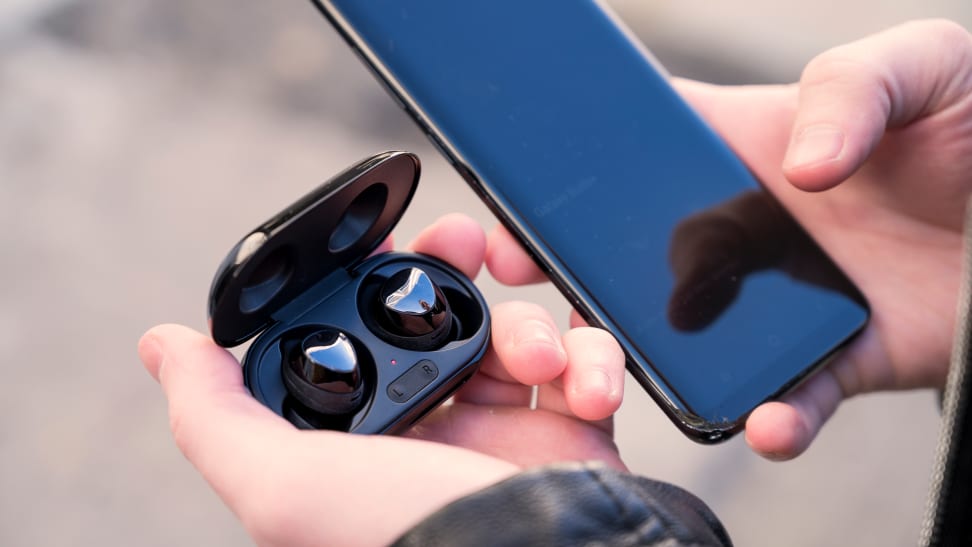 Credit:
Reviewed / Jackson Ruckar
Credit:
Reviewed / Jackson Ruckar
Products are chosen independently by our editors. Purchases made through our links may earn us a commission.
You've seen them everywhere: those little white 'buds sticking out of everyone's ears. As much as we were initially looking forward to dunking on the Apple AirPods, just like everyone else, we loved them too.
However, Samsung recently debuted its new and improved Galaxy Buds+. They're true wireless earbuds available in multiple colors—with a charging case—for $150. They iterate upon the first generation Galaxy Buds by adding Qi-certified wireless charging for the case, an additional exterior microphone, and improved sound and battery life.
So, are the new Galaxy Buds+ a better choice for most people than the basic Apple AirPods? Let's break it down.
Price
As price goes, the Samsung Galaxy Buds+ have a leg up on the Apple AirPods. You can get the Samsung Galaxy Buds+ (the true wireless earbuds and their charging case) for $150 MSRP.
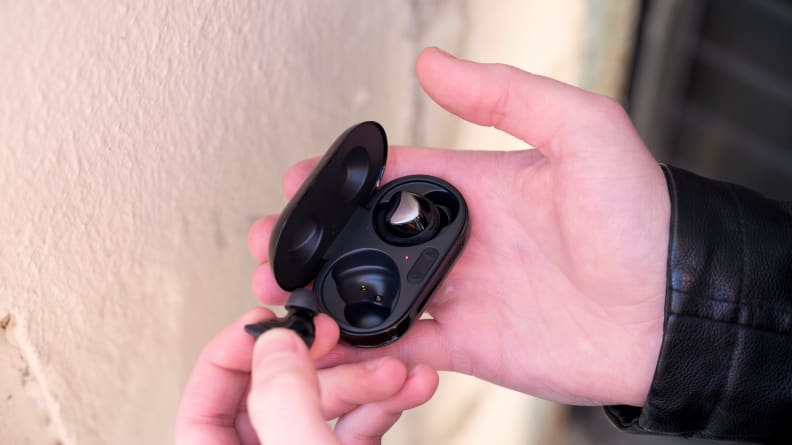
You can get the new Samsung Galaxy Buds+ for $150—or sometimes less online—which makes them a better pick, price wise, than the Apple AirPods.
By comparison, the latest Apple AirPods start at $159 (if you buy the version that includes the standard charging case) or $199 for the version that includes the wireless charging case.
So, regardless of which version of the AirPods you buy, you're paying more for them—unless they're on sale—than you are for the Samsung Galaxy Buds+.
Our pick: Samsung Galaxy Buds+
Battery life
Battery life is always important for wireless headphones, but especially so for true wireless earbuds. Because they wield such a paucity of spatial real estate—er, they're small—there isn't room for large batteries. The first wave of true wireless earbuds had notoriously short battery lives, and while this can be mitigated by the charging case, you also can't listen to them while they're charging, making between-charge battery life an especially important spec.
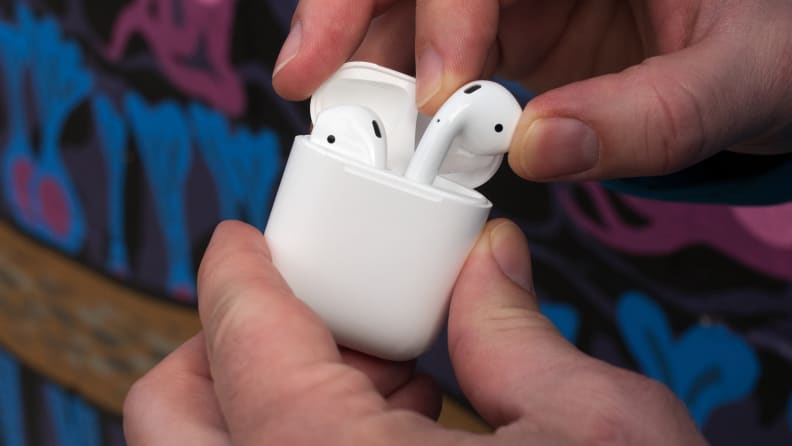
Apple's AirPods give you about 5 hours of listening per charge, but over 24 hours of charge time from the case.
Unfortunately for the getting-long-in-the-tooth Apple AirPods, they only give you about 5 hours of battery life per charge. Regardless of which charging case you have (wired or wireless), you can get around 24 hours of charge from the case before you need to find an AC outlet. The total life here is pretty decent, but the per-charge life feels like something from 2016 (because it essentially is).
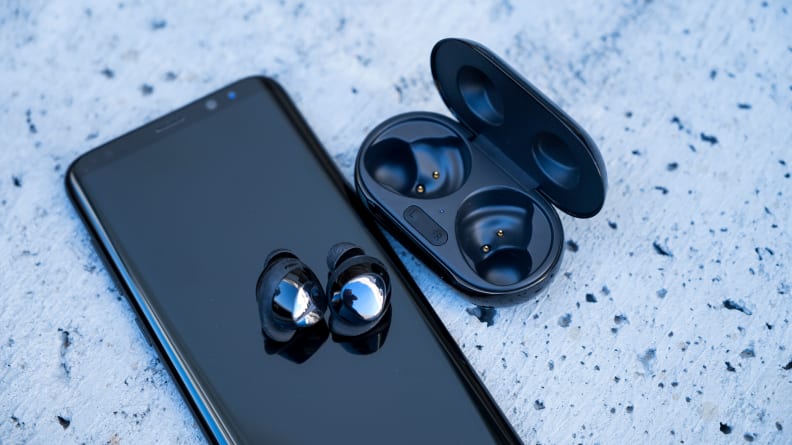
You get about the same amount of total battery time between the AirPods and Buds+, but the latter give you much longer listening time between charges.
The much newer Samsung Galaxy Buds+ take a different approach. The 'buds themselves have a much longer charge compared to the AirPods—around 10 or 11 hours when used in a "normal" way—but their case only offers one full charge per cycle, meaning the maximum battery life you're getting is around 20-22 hours.
Considering their net total hours are pretty similar, but you get almost twice as much listening time from the Galaxy Buds+ before you have to put 'em back in their case, we've gotta give it to Samsung again.
Our pick: Samsung Galaxy Buds+
Features
Features are one area where 2019 and 2020 true wireless earbuds have really started to stand out from those that came out three or four years ago. Where features go, the Galaxy Buds+ have a natural advantage.
With the latest earbuds from Samsung, you're getting 2-way dynamic speakers that comprise both woofer and tweeter drivers, two outer microphones and one inner microphone, IPX2 water resistance (meaning they're moderately sweat-proof), and easy connection over Bluetooth via the either the "Samsung Wearables" app on Android phones or the "Samsung Galaxy Buds+" app on Apple phones.
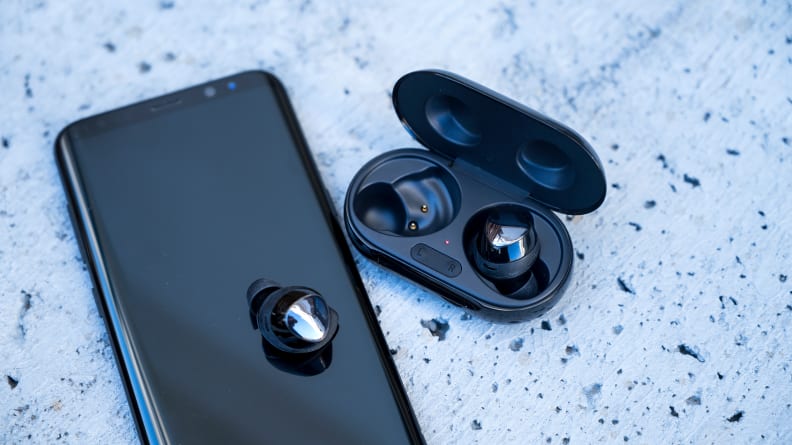
The newer Galaxy Buds+ give you Ambient sound mode, an adjustable EQ, and light sweat-proofing, making them altogether more flexible than the AirPods.
We think most users will also appreciate the inclusion of Samsung's version of a transparency mode, called Ambient sound. The outer microphones are used to amplify what's around you, making it safer for bicyclists and joggers to use these without being completely isolated. Finally, you're also getting Spotify integration via the app, if you're into that kind of thing.
The only major drawback to the Galaxy Buds+ is that they don't work with older phones. According to Samsung, the Buds+ are "compatible with smartphones and tablets running Android 5.0 or higher and with more than 1.5GB of RAM. [They're] also compatible with iPhone7 or later models with the iOS 10 or higher." So while this won't be a problem for most folks, it's worth keeping in mind if your phone is on the older side and you find yourself interested in these 'buds.
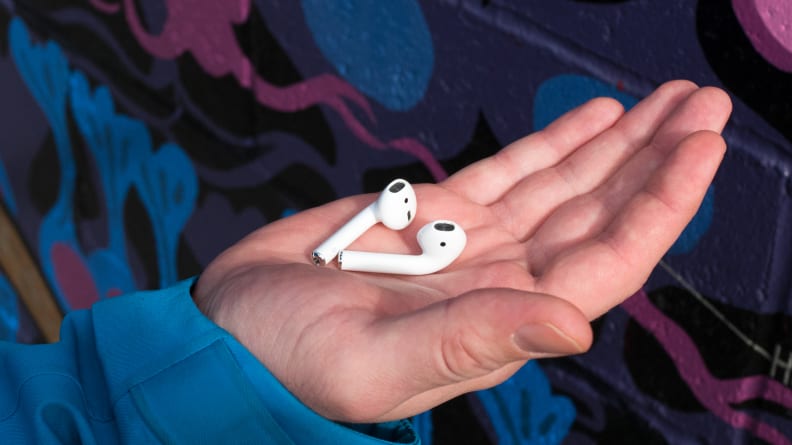
With the AirPods, you're getting Apple's H1 headphone chip and decent speakers, but not much else by way of usable features like waterproofing or a "transparency" mode.
With the Apple AirPods, you can still expect a snappy Bluetooth connection experience regardless of whether you've got an Android or Apple phone, but you aren't getting any sort of water resistance or transparency mode here (though with the loose fit most people get from them, it may not really be necessary). Still, the AirPods deliver dual beamforming microphones, dual optical sensors, Apple's H1 headphone chip, and various accelerometers. You're also getting full Siri integration, which will make them feel very familiar and usable for Apple users especially.
However, it's pretty clear that for what you're paying you're getting more functionality and flexibility from the Galaxy Buds+ in terms of features.
Our pick: Samsung Galaxy Buds+
Sound quality
For attentive listeners, this category might be the most important one. Fortunately for us, it's also a pretty easy one to make the call about.

The AirPods don't sound bad, per se, but they're pretty average, and their loose seal doesn't provide much bass presence at all.
To make a long story short, the Apple AirPods do not sound very good. They fit fairly loosely in most people's ears, which is the easiest way to basically eliminate bass presence in most music. They don't sound bad, but their inability to seal well doesn't give them a good shot at sounding very good. They're fine for podcasts and won't bother casual listeners, but they aren't a friend to musical details.
The Samsung Galaxy Buds+, on the other hand, don't sound amazing, but they do offer various "fit" options (more on that below). This gives them considerably more bass presence, in general, than the Apple AirPods.

The Buds+ offer various "fit" options, making it easier to get a good seal and preserve bass. They can be tinny at times at higher volumes, but overall their sound quality is solid for what you're paying.
Their app also gives you a fairly robust EQ preset system, making it easier to tailor their sound to your preferences. While reviewing them, I found that at louder volumes their treble frequencies were occasionally tinny, but that they sounded pretty darn good otherwise, especially where bass and midtones were concerned.
Our pick: Samsung Galaxy Buds+
Wireless connection
While I was really expecting to see big differences in terms of wireless connectivity here, this is one area where these headphones are still pretty even. The AirPods, as old as they are, still connect fluidly and easily with Apple and Android phones. And other than for older devices, the Galaxy Buds+ also connect without issue to most of what you throw at them.
Our pick: Draw
Design and fit
There's no denying that the design of the original Apple AirPods are, at this point, iconic. Just seeing those little white 'buds sticking out of everyone's ears has given them a fair amount of cultural significance—certainly, they're more recognizable than any headphones from Samsung.
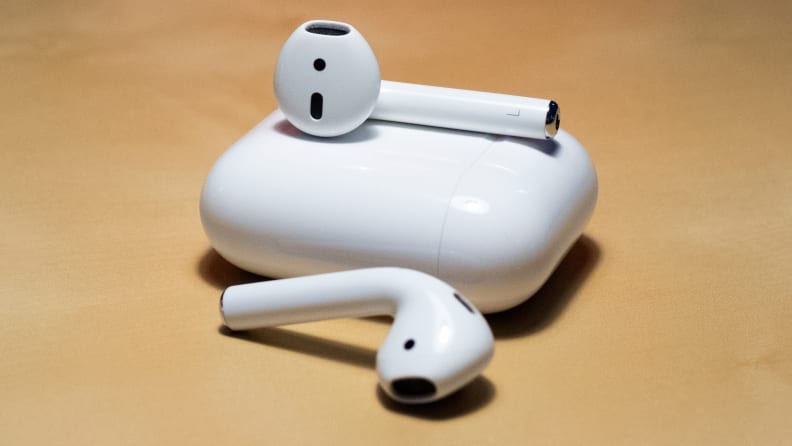
The AirPods may have an iconic design, but the best advice we found for improving their fit was to "just get used to them."
That said, there's clearly a case of fashion over function here. By most counts, the AirPods aren't terribly comfortable (especially compared to the much better AirPod Pros), and their loose fit—as we described above—spells problems for bass presence and general sound isolation. Considering the top suggestion for improving the AirPods' fit is to "just get used to them after a few days," it doesn't seem like a problem that Apple is planning to address—especially since we're four years into the AirPods' life cycle.
By comparison, the Samsung Galaxy Buds+ are pretty comfortable, at least initially. I'm not personally crazy about the long-term comfort of most earbuds and true wireless headphones, but Samsung's mix of firm rubber stabilizing elements and hard but lightweight plastic make the Buds+ more comfortable than a lot of what I've tried in the past. Sure, they'll never be as comfortable as the plushy cups of some high-end over-ear headphones, but they're not bad at all—and are definitely more comfortable than the AirPods.
Where design goes, that's pretty subjective, but if the look of Apple's little white 'buds aren't your cup of tea, the Buds+ do at least come in a variety of colors: white, blue, black, red, and pink. Almost based on that alone, we've gotta give it to the SGB's.
Our pick: Samsung Galaxy Buds+
Conclusion
Let's face it: Apple AirPods have been selling by word of mouth for a while. Just looking back at our comparisons here, it's almost flabbergasting why anyone would buy them instead of Samsung's new 'buds.

When it comes to a direct comparison with the Apple AirPods, we think most folks will be happier with Samsung's newer Galaxy Buds+ earbuds.
The Buds+ trump the AirPods in almost every category, and they're cheaper to boot. Unless your phone isn't compatible with them or you just really love Siri, there's no reason not to buy the Samsung Galaxy Buds+ over the Apple AirPods. It almost feels like sacrilege to say it, but it's the truth.
